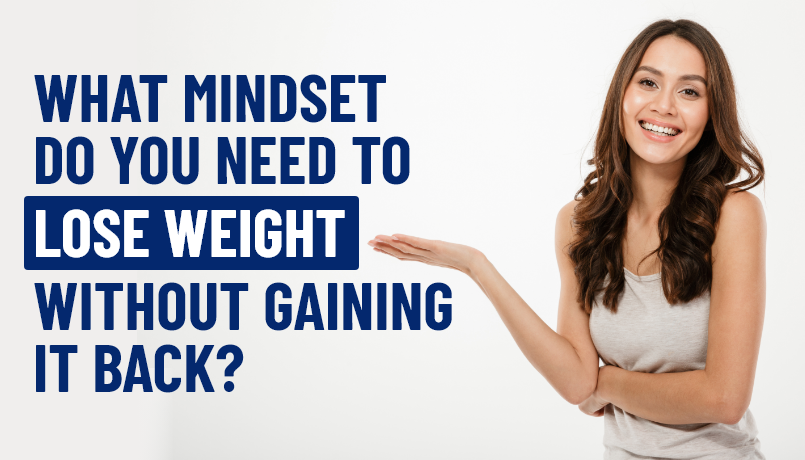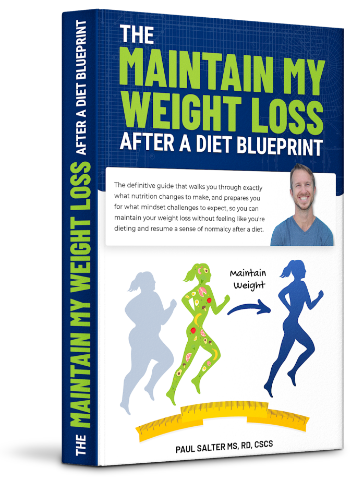What Mindset Do You Need to Lose Weight Without Gaining It Back?

The mindset you need to lose weight is more important than the actual nutrition approach you take. This is because there are dozens of different approaches to healthy eating that can be used to achieve sustainable weight loss. As long as the approach is simple, unique, and flexible, it will serve you well. What mindset do you need to lose weight? This article will detail key characteristics and beliefs of a sustainable weight loss mindset.
What it Means to Have A Weight Loss Mindset
Your mindset is the makeup of the thoughts, attitudes, and beliefs you hold.
Collectively, your mindset influences the actions you take, the results you achieve, the identity you possess, and the reality you experience.
This is important to recognize because our word choice and self-talk both make up the collection of hundreds of thousands of thoughts that we have on a daily basis.
Our thoughts directly influence the actions we take. When we take an action consistently, it becomes a habit.
Our habits shape our results and outcomes, which ultimately influence both our identity and reality.
It all begins in the mind.
What mindset do you need to lose weight?
A positive, strong, and growth mindset.
- Positive referring to the way you speak to yourself anf the type of thoughts you have about yourself.
- Strong referring to your ability to remain persistent and display grit when you encounter challenges
- Growth referring to have the unwavering belief that you can learn new skills and handle any obstacle life throws your way.
Beyond these three key characteristics, however, the mindset you need to lose weight is influenced by your relationship with and to dieting, time spent not dieting, and weight-loss expectations.
Change Your Definition of the Word “Diet”
Did you know the word “diet” actually has TWO definitions?
The first, which you’re most familiar with, is “intentionally eating in a calorie deficit to lose weight.”
The second: “a habitual way of eating.”
To illustrate the second version in action, think about it like this: when someone tells you that they follow a plant-based diet, do you automatically assume they’re trying to lose weight?
Likely not.
What you glean is that they consistently (or habitually) prioritized plant-based food choices.
There’s NO mention or assumption about weight loss whatsoever!
The best way to start a diet is to first change your definition of the word diet to focus on building a foundation of healthy, habitual eating habits. This is important because if this rock-solid foundation is not in place before you start a diet, then you’re far more likely to revert to past behaviors, which led to you desiring to diet in the first place!
Change Your Mindset Around Dieting– What Mindset Do You Need To Lose Weight
If you’re anything like me or the thousands of clients I’ve worked with, you have a unique love-hate relationship.
On one hand, you love how good you feel when you’re consistent in the gym and the kitchen, and, of course, the physical changes you experience. Yet, on the other, you have a track record of taking unsustainable approaches to weight loss, and therefore, have developed a handful of limiting beliefs and toxic thoughts related to food.
The result?
Dieting carries an underlying negative connotation, yet, we actually feel normal when we are dieting…
Can you relate?
Strange, right!?
The mindset you need to lose weight is that dieting is a tool – not a lifestyle.
Read that again.
A diet is a short-term commitment in which you intentionally eat fewer calories than you burn to lose body fat. It’s not something you’re seeking all year.
In fact, if you take the time to best prepare yourself for a successful diet by laying a strong foundation of healthy eating habits and taking a sustainable approach to weight loss your next diet could be your last! This means you could spend potentially the rest of your life – or at least 95 percent of it – NOT dieting…
These ladies have joined The 5% Community – will you?
How does that make you feel right now?
If anxious and uneasy come to mind, you’re not alone. Let’s address that next.
Change Your Mindset Around NOT Dieting
If you’re anything like me or one of the members of our 5% Community, you were conditioned by the diet and fitness industry to believe that frequent dieting was the norm, which left you anxious and feeling out of control when not dieting.
This is not the norm, despite us being led to believe it is.
As I mentioned previously, learning how to take an approach to weight loss that yields sustainable results puts you in a position to spend the majority of your life not dieting.
This should be a cause for celebration!
Yet, many of us fear this because dieting has become our comfort zone.
It’s important to remember that a true diet (calorie deficit) is a significant psychological, emotional, and physiological stressor. It’s not optimal, to say the least, to spend the vast majority of our lives in such a state of stress.
What is most important to help you feel, look, and be your best is having a foundation of healthy eating habits alongside a positive relationship with food. This pairing is possible – and more effective – when you are eating enough food to thrive, not enough to merely survive and attempt to lose weight.
When you’re providing an appropriate amount of fuel for your body to thrive rather than survive, energy levels skyrocket, cravings fade, and wellbeing, confidence, and joy all drastically improve.
Cheers to getting comfortable spending more time here!
Change Your Mindset Around Sustainable Expectations
The mindset you need to lose weight needs to be one rooted in realistic expectations and not exaggerated marketing campaigns. Yes, you could lose 50 pounds in a month, but do you really think the approach you’d take would be sustainable and support lifelong weight maintenance?
I didn’t think so.
A sustainable rate of weight loss is losing between 0.5 and 1.0 percent of your body weight per week. For instance, a 200-pound person would target a rate of weight loss of 1.0 – 2.0 pounds per week.
Moreover, it’s important to recognize that the ideal duration to spend dieting that I’ve observed having worked 1:1 with more than 1,500 men and women is roughly eight weeks.
A longer diet may – and this is not guaranteed – generate more short-term weight loss, but the longer a diet extends beyond eight weeks, typically the hard it is to sustain the weight loss.
Continuing with the example above, a 200-pound person can reasonably expect to lose between eight and sixteen pounds during an eight-week diet. And if he or she has a weight-loss goal beyond that, the best next course of action is to spend between seven and twelve weeks in a post-diet maintenance phase.
Our “Maintain My Weight Loss After A Diet Blueprint” walks you through everything you need to know about the post-diet maintenance phase. You can grab this book for free by clicking here.
The Mindset You Need
What mindset do you need to lose weight?
One that is rich in positive self-talk and thoughts, primed for grit, and resilient in belief in yourself – that you can handle any challenge life throws your way. Additionally, the mindset you need to lose weight is one in which you’re clear on reasonable weight-loss expectations and how to best use dieting- as a tool rather than a lifestyle.
If you need support building a weight loss mindset or rebuilding your relationship with food, click here to join The 5% Community and join women just like you who are working to feel, look, and be their best!
Share this post
 Paul Salter
Paul Salter
